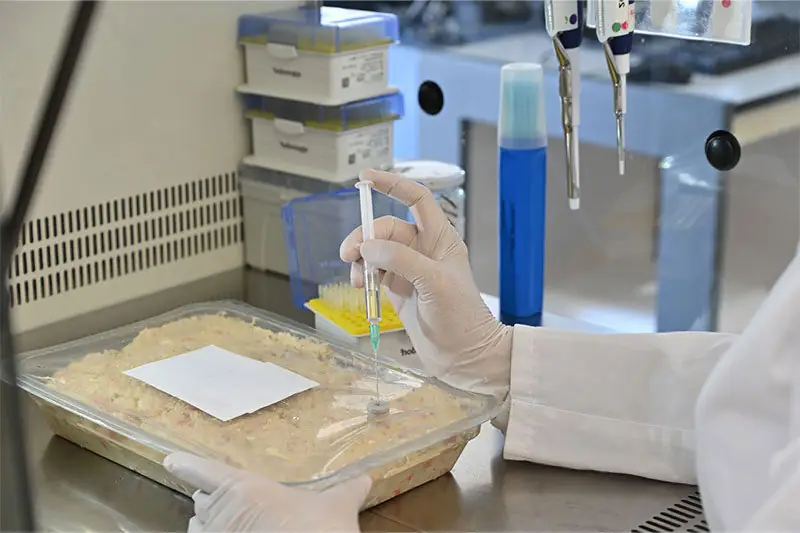Escherichia Coli Detection in Baby Care Cosmetics Testing
The presence of Escherichia coli (E. coli) in baby care cosmetics can pose significant health risks, particularly to infants and young children whose immune systems are still developing. This bacterium is a common indicator organism for fecal contamination and serves as a sentinel for potential pathogenic microorganisms that could contaminate cosmetic products. Ensuring the microbiological safety of baby care products is paramount in protecting consumer health and maintaining brand reputation.
Microbiological testing, especially for E. coli, plays a critical role in safeguarding the integrity and quality of cosmetics intended for infants. Regulatory bodies such as the US Food and Drug Administration (FDA), European Commission, and other national and international standards organizations emphasize stringent controls to prevent contamination that could lead to severe health issues.
The methodology for detecting E. coli involves rigorous sample preparation, selective enrichment, incubation under specific conditions, and subsequent identification using biochemical tests or molecular techniques like polymerase chain reaction (PCR). This process ensures accurate detection of the pathogen without cross-contamination between samples.
Quality managers in baby care brands must prioritize this testing to comply with stringent safety standards. Compliance officers should be aware that non-compliance can result in product recalls, legal penalties, and damage to brand image. R&D engineers need reliable data from these tests for continuous improvement of formulations. Procurement teams play a crucial role by ensuring suppliers meet the necessary quality assurance protocols.
Understanding the potential risks associated with E. coli contamination is essential for all stakeholders involved in the development, production, and distribution of baby care cosmetics. By implementing robust testing procedures early in the product lifecycle, companies can ensure their products are safe and fit for use by consumers.
The significance of this testing cannot be overstated. It not only protects public health but also reinforces consumer trust in the brand's commitment to safety and quality. Regular microbiological inspections using validated methods and adherence to regulatory guidelines help maintain high standards throughout the supply chain.
Why It Matters
The importance of detecting E. coli in baby care cosmetics transcends mere compliance with regulations; it reflects a broader commitment to public health and consumer safety. The presence of this bacterium can indicate the potential for other harmful microorganisms, which could compromise the integrity of cosmetic products.
From an operational perspective, rigorous testing ensures that production processes are free from contamination risks, thus minimizing the need for post-production recalls or rejections. This proactive approach saves time and resources while enhancing brand reputation.
In terms of consumer confidence, transparent communication about the implementation of such robust testing protocols can significantly improve trust between brands and consumers. Parents and guardians value peace of mind when it comes to products used on their children's skin, making this a key factor in market success.
Moreover, compliance with international standards like ISO 18765:2019 for microbiological examination of cosmetics provides a benchmark that enhances the credibility of testing results. This standardization ensures consistency across different laboratories and jurisdictions, facilitating easier trade and acceptance globally.
The impact of effective E. coli detection extends beyond individual products; it contributes to broader industry standards and practices. By setting high benchmarks for hygiene and safety, companies set a precedent that can influence the entire market towards greater vigilance against contamination risks.
International Acceptance and Recognition
- ISO 18765:2019: This international standard specifies requirements for microbiological examination of cosmetics, including methods for detecting E. coli.
- The European Union's Cosmetics Regulation (EC No 1272/2008) mandates stringent hygiene controls to prevent contamination with harmful microorganisms.
- The US FDA requires companies to ensure that their cosmetic products are safe and do not contain contaminants like E. coli.
- The British Pharmacopoeia (BP) provides guidelines for the microbiological quality of cosmetics, emphasizing the importance of testing for E. coli.
- The International Organization for Standardization (ISO) standards, particularly ISO 18765:2019, are widely recognized and accepted globally.
- The American Society for Testing and Materials (ASTM) offers complementary guidelines that complement international standards in ensuring product safety.
- World Health Organization (WHO) recommendations stress the need to implement robust testing procedures to protect public health.
- The European Pharmacopoeia also mandates thorough microbiological examination, including detection of E. coli, for cosmetic products intended for use on children and infants.
These international standards and regulatory frameworks underscore the universal acceptance and recognition of rigorous E. coli testing in baby care cosmetics. Compliance with these guidelines not only ensures product safety but also facilitates easier trade and market access across various jurisdictions.
Competitive Advantage and Market Impact
In today's competitive marketplace, ensuring the microbiological safety of baby care products is more than just a legal requirement; it’s a strategic business decision. Companies that invest in thorough E. coli detection not only meet regulatory standards but also build a reputation for excellence.
A strong commitment to product safety can differentiate brands from competitors, offering them a competitive edge in the market. By demonstrating a proactive approach to quality assurance, companies can attract and retain loyal customers who prioritize health and hygiene above all else.
Moreover, compliance with international standards enhances brand credibility and trustworthiness, which are crucial factors influencing consumer purchasing decisions. This reputation for reliability and safety can translate into increased sales and market share.
In an increasingly globalized industry, adhering to these stringent testing protocols ensures that products meet the diverse requirements of different markets around the world. This uniformity in quality standards across various jurisdictions simplifies logistics and marketing efforts, making it easier for companies to expand their reach without compromising on product safety.
The commitment to microbiological safety also aligns with broader sustainability goals by reducing the likelihood of recalls or rejections due to contamination issues. This not only minimizes operational disruptions but also helps maintain a consistent supply chain, ultimately contributing to long-term profitability and growth.
By leveraging advanced testing methodologies and adhering to international standards, companies can position themselves as leaders in the industry, offering superior product quality that sets new benchmarks for safety and hygiene.





